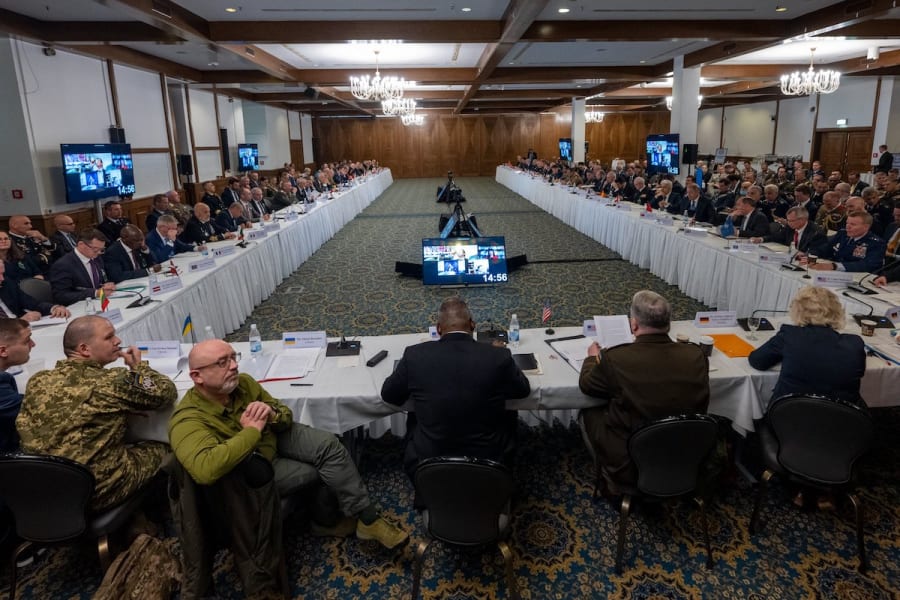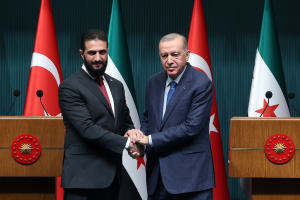In apparent shift of policy, Israel participated in US-led defense conference on Ukraine
The Jewish state has attempted to strike a balance between supporting Ukraine, while not angering Russia

Israel participated in the U.S.-hosted defense conference on Ukraine’s security on Tuesday at the U.S. Ramstein Air Base in Germany with representatives from more than 40 countries in attendance, including non-NATO members.
Brig. Gen. (Res.) Dror Shalom, the Defense Ministry’s head of political security, represented Israel in lieu of Defense Minister Benny Gantz who was unable to participate due to Holocaust Remembrance Day, which began Wednesday evening. The conference took place just days after U.S. Secretary of State Antony Blinken and Secretary of Defense Lloyd J. Austin met with Ukrainian President Volodymyr Zelenskyy in Kyiv.
The main purpose of the defense conference, according to Gen. Mark Milley, chairman of the U.S. Joint Chiefs of Staff, was to coordinate security assistance to Kyiv, including heavy weaponry. “The next several weeks will be very, very critical,” Milley said. “They need continued support in order to be successful on the battlefield. And that’s really the purpose of this conference.”
In a press conference on Tuesday, Austin announced that the security conference at Ramstein had been “highly constructive.”
“I know that all the leaders leave today more resolved than ever to support Ukraine in its fight against Russian aggression and atrocities,” Austin said. “And I know that we're all determined to do even more to better coordinate our efforts.” He also said that the security conference will continue meeting as “a monthly contact group on Ukraine's self-defense.”
“The contact group will be a vehicle for nations of goodwill to intensify our efforts and coordinate our assistance and focus on winning today's fight and the struggles to come,” Austin said. “The monthly meetings may be in person, virtual or mixed, and they'll extend the transparency, the integration and the dialogue that we saw today. “
It is unclear if Israel will continue participating in the contact group in the future. Zelenskyy has criticized the Jewish state for refusing to send defensive weapons and military equipment to Ukraine. Israel has attempted to strike the right balance between supporting Ukraine while not angering Russia, especially given Russia's position as a critical player in Syria, where Israel regularly targets Iranian or Iranian sponsored assets.
In March, while speaking to the Israeli Knesset (Parliament) via Zoom, Zelenskyy pleaded with Israel to send its Iron Dome missile defense system to protect Ukrainian civilians from Russian bombardments.
“We are turning to you and asking whether it is better to provide help or mediation without choosing a side,” Zelenskyy told Knesset members and ministers at the time. “I will let you decide the answer to the question, but I do want to point out that indifference kills.”
Ukraine has been asking to buy the Iron Dome system from Israel for a long time. Mariupol, the Ukrainian city that Russian forces have recently devastated and which remains under siege by Russian troops, had already talked about purchasing the system to protect its airport in June 2021.
Meanwhile, Israel has provided several shipments of humanitarian aid to Ukraine, in addition to setting up a field hospital for refugees. The hospital, located in the city of Mostyska – close to the Polish border in western Ukraine – operates with 100 staff members, 80 of them doctors and nurses.
In what could perhaps signal a potential shift in policy, Gantz announced last week that Israel would send flak jackets and helmets to Ukraine – which the war-torn country has been asking Israel for since early March – but that they would only be provided to civilian rescue and medical forces, not military. Israel had previously refused to send helmets and flak jackets.

The All Israel News Staff is a team of journalists in Israel.














